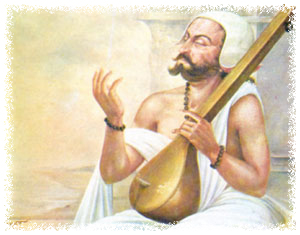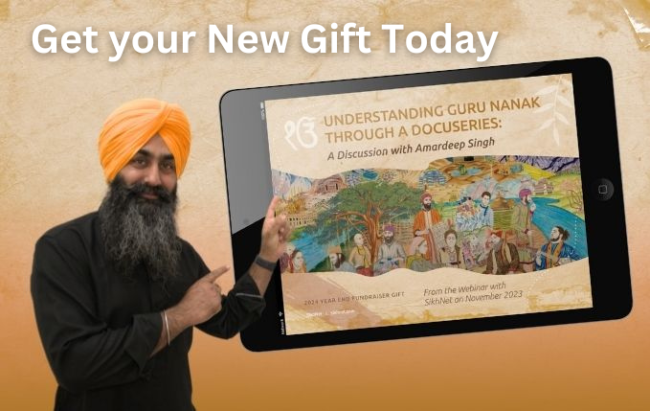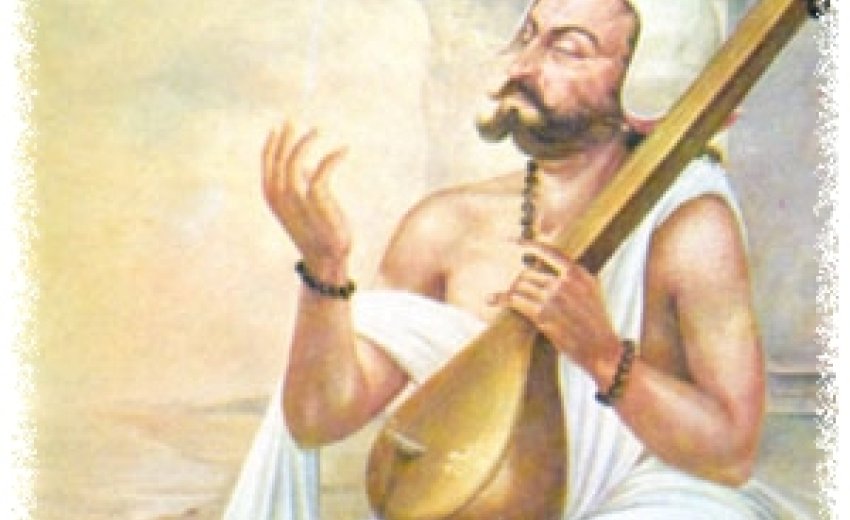 |
| O man abandon thou the association of those turned away from God. SGGS-1253 |
It seems like a distasteful word. I used to think of submission as giving my power to someone else and that was never attractive to me before, yet it is our ultimate goal in Sikhi. We are asked to give our head, even our whole being to our Guru. A year ago, this day I heard myself saying "I am a Sikh," and living immediately became an exercise in submission for me. I have been reflecting on what has certainly been the most humbling, challenging year of my life and have found that this action, one which I once thought was equivalent to being weak, is the greatest choice of all.
Before I came to the Sikh path, many of my years were spent working with horses. Training can be understood as a process of submission of horse to human and it certainly gave me a powerful feeling. When I left equestrian sports professionally over an ethical dilemma, horses had long been engrained in my being. Consequently, I wondered who I was if I was not an equestrian and set off on the path to find the answer.
After a few years, I crept back into relationship with horses. There was something about that connection that was so entrancing in its subtlety. A sweet, strong, aged ex-show horse became my partner for a year. Zoe's neuroses were terribly trying as she was always fighting my direction and trying to run, but the small instances of connectedness were so alluring that they kept me coming back to work with her. Then a wise, though not well-known trainer visited the area. He had been an accomplished rider and trainer in his younger days but he contented himself with a small training barn and occasional instructional clinics at other facilities. When I walked into one of his training sessions, he was teaching a rider on a high-strung, sensitive mare similar to the one I rode. His advice was very simple. "Be still," he said. "Let her give herself to you." Over the next half hour, the transformation in the partnership of that horse and rider was readily apparent. The horse gradually stopped throwing her head and rushing forward. The following day they rode together in peaceful unison.
I went back to the stable where I rode and tried his advice. In a few weeks Zoe was a different animal. Instead of a power struggle, our rides became a time to learn to communicate with each other. I rode Zoe for the last time two months later. We floated around a course of jumps in what seemed like blessed silence. My thoughts were her actions; I barely moved a muscle in guidance. Zoe's owner of eight years watched the ride that morning and when we finished, her jaw hit the floor. "What did you do?" she asked. I told her about the trainer I saw and explained, "I just stopped fighting." The mare couldn't fight if there was no one to oppose. That ride was so fulfilling and expanding for me, when I dismounted, I stroked the mare on her sleek brown neck, looked in her eye and quietly said "I'm done." I did not train a horse again for over five years.
A few weeks ago, shortly before leaving my medical rotation in South Dakota, an owner of a horse farm I had met in passing invited me to work with any one of her many untrained horses. I pondered the idea for several days. I really thought this aspect of my life had passed. I had donated nearly all of my horsey stuff when I went back to school but living in South Dakota had elicited that desire to be with horses again. It seemed I was meant to go.
The farm adjoined a national wildlife preserve and stretched through fields of tall grasses, bee balm and sage. Driving down a mile of gravel, deer and wild turkeys peaked out from the trees. When I arrived at the farm, the owner and I walked out into the field amongst the horses. They were exotically fine Spanish mares, friendly and curious. She told me to choose one. I couldn't possibly pick so I asked them aloud, "Who wants to play?" A sweet-faced gray turned and looked at me so I walked over and patted her shoulder and said "Come on." We all walked together toward the round pen.
Even if you never worked with a horse in a round pen, it's a simple thing to understand. The horse is free in every way inside the space throughout the process of training. The trainer only controls the speed and direction of movement of the horse. The goal is to convince the horse to stop, listen and eventually choose to trust. There is no need for constraints or even to physically exhaust the animal, just to demonstrate that when the horse chooses to focus fully on the trainer, it is rewarded with the peace of being still. The stress level is gradually raised by new experiences. A rope, a blanket, the trainer's touch---anything which is necessary for the horse to accept to build the relationship--- is introduced then removed before fear causes the horse to step away.
I spent 35 minutes in the ring with Encontada before she decided to walk up to me on her own and touch her muzzle to my belly, signaling that she accepted my leadership and wanted to learn. After that, there was nothing she would not let me do. Horses who are thinkers resist greatly in the beginning, but when they understand the idea, the fighting is done. That was Encontada. Even after walking out of the pen back into the field, she wanted to stay by my side instead of joining her herd. There is no way to force that kind of relationship from another being. The connection is too beautiful for words.
As I drove home, processing how my path once again led to a horse, I was struck by a parallel. My own life, my own acceptance of the truth of my soul, my purpose and the path of Sikhi unfolded right before me. I laughed at how all of my fighting, running away and anxiety was always followed by crawling back to my Guru in stronger faith. I had definitely been trained! The Guru always stood patiently in the center of my space, reassured me each time I came close, gently reminded me of an easier way to live each time I moved away. Each day I relinquished more of my mind's control to accept the joy of living in the Guru's Grace. As I approached home, I was reminded of another difficult time. Long before, had I chosen to recognize it, a different horse had already shown me what I had always really needed to embrace.
About ten years ago, a formerly abused steed was in my care. It was late on a Saturday night and the rest of the riders had gone home. I had released Cody in the indoor arena so he could freely stretch his legs. I couldn't ride him due to a minor injury. Cody had been mishandled in many ways, but worst of all, he had been hit in the head by a previous trainer. It had been a long process to convince him to tolerate my routine touches to his face. Even after a year with me he still occasionally panicked at objects too close to his head.
That December night I sat in the middle of the arena, huddled in my coat and slouched on a cold plastic chair. My eyes were half-closed, my muscles slack with exhaustion. I was working seven days a week to support a household that was failing while my then husband was in the process of self-destructing. As my breathing slowed and my mind grew still with sleep, I heard the nearing of Cody's snuffling breaths and soft, thudding steps in the deep sand. He came close and blew warmly in my face and tickled me with his whiskers before lowering his head. He just stood there in front of me with his head between my knees. This animal, who held such deep-seated painful distrust of humans, bowed before me. Tears, I very badly needed to release, rolled down my dusty cheeks. Gingerly, I reached out and stroked his ears and fingered his forelock hair. He stayed there without moving. I could not have imagined that kind of submission from such a damaged beast. When I felt so alone and beat down in the world, there was this sorely mistreated horse offering up his fears and insecurity to bring God's compassion to me.
Throughout the years, these humble servants, these divine creatures have allowed me to make my mistakes with them as I learned to find myself. They who have been my comforters, partners and companions have taught me the ultimate lesson: The power and grace of submission. Like Guru Arjan who sacrificed his body on the hotplate, Guru Teg Bahadur who gave his head for a whole community of faith and Guru Gobind Singh who knelt before his Khalsa, these horses have inherited a legacy of submitting themselves to others for the sake of greater things. All those years I thought I was so smart and powerful, it was really they who were teaching me.
Encontada and I are very alike, yet it took only 35 minutes for her to recognize the wisdom of connecting through submission compared to the space of over 35 years it has taken me. Shortly after meeting her, I woke up from my bed one morning in a complete state of peace. Over the summer I had been spending a lot of time alone fighting myself, my purpose and my commitments to my Guru. That morning everything was different. It was exactly ninety-one days after my Amrit Sanchar when I got up, looked at myself in the mirror and just knew the fighting was finished. I had not given in to weakness but I had submitted and somehow that meant that this part of the game was won. Smiling at my wondrous reflection, even my fuzzy chin, I said out loud, "I'm done," just to be sure. Submission is a powerfully beautiful word.
I didn't have the heart to ride Encontada that day on the farm. I don't know that I'll ever ride a horse again. Maybe it's a tribute to all of the sacrifices horses have made for me that keeps me from putting myself in that position. Perhaps I'd just rather walk beside my hoofed friends now, in recognition of my own submission.
Harsimranpreet Kaur, writing from medical rotation in San Jose, Costa Rica

